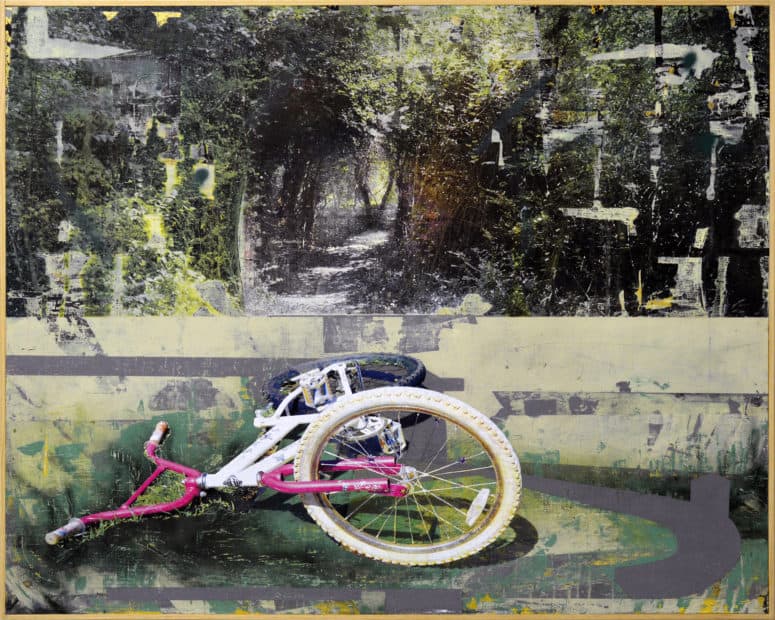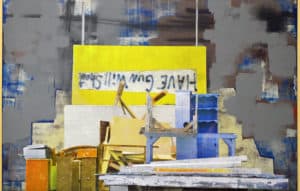Artist Explores Social Commentary of America

Louisiana native Andrew Blanchard will exhibit a collection of new work in Converse College’s Milliken Art Gallery beginning Thursday, September 6, 2018. The evening begins with a Gallery Talk with the Artist at 6 p.m., during which Blanchard will include discuss his career and art process, followed by an opening reception.
As the Director of Studio Art and Associate Professor of Printmaking and Photography at Converse, Blanchard spent the Spring of 2018 on sabbatical to explore socially induced issues and its effect on his art. The works featured in It’s Like This, Though will showcase Blanchard’s mixed-process prints mounted on wood panel while his imagery will deliver a contemporary social commentary of America. The exhibition will be available to view through September 12.
“Race, politics, religion, landownership/management, and socio-economic concepts have factored into my artwork for over a dozen years now.”
Professor Andrew Blanchard
“Race, politics, religion, landownership/management, and socio-economic concepts have factored into my artwork for over a dozen years now. Ambivalence has always allowed for a balanced playing field for my thoughts, emotions, hopes, prayers, dreams and harsh realities,” states Blanchard.
Blanchard is a proud graduate of Ole Miss’s MFA program and his work was recently added to the permanent collections of the Ogden Museum of Southern Art in New Orleans and the Mississippi Museum of Art in Jackson, and it is featured or forthcoming in publications including Ecotone, Electric Dirt, Printmakers Today, New American Paintings, the International Painting Annual (nos. 4 and 7), and the Oxford American, which in 2012 named him among the New Superstars of Southern Art.
His sabbatical semester in the spring of 2018 became a journey of creativity and immersion in his craft. “I kept a strict regimen in regard to hours spent in my studio, working as if it were a regular day job. And as usual, I always came back at night for a few hours. To date, this is the most complex, layered and time intensive body of work I have yet to undertake,” he said.
“Many artists who are also educators struggle with either sticking to a mold via one subject for an entire career or they flounder and make disjointed works of art that are scattered all over the place…”
Andrew Blanchard
The depth and longevity of the experience shaped his focus for this new body of work. “Having made artwork that has dealt with a ‘sense of place’ or region specific for a good decade now, one of the biggest takeaways from my time off was broadcasting a more national message; say, not as ‘Southern’ rather, more American. In the midst of creating this new body of paintings and as winter and spring made way for summer, I found myself addressing a greater interest in social commentary. Not just someone who paints as a documentarian of cultural character, rather, extending my grasp into journalistic efforts.”

Blanchard feels satisfaction in this new body of work, seeing it as successful in terms of conceptuality and visual appeal, while a bit more progressive in terms of his personal growth. “Many artists who are also educators struggle with either sticking to a mold via one subject for an entire career or they flounder and make disjointed works of art that are scattered all over the place,” he said.
“Time away from my teaching duties impacted my ability to challenge myself; I tasked myself with several trials: new techniques, such as implementing a more cinematic space, incorporating new methods of application, and the like. I’ve made larger bodies of work under far more rigorous and time constraining periods throughout my life, but I’m really appreciative of this opportunity – very blessed to have been awarded this leave of absence. It’s not so much about what I learned about myself, but rather I learned about other folks, of which is addressed in my new paintings.”
As artist and educator, Blanchard brings back to his students much from the sabbatical experience that benefits their learning and development. “I can remember these types of absences when I was in undergrad and graduate school. Several of my mentors and professors were able to accomplish large projects that catapulted them into the spotlight. That motivation and success bolsters your longevity in teaching; students hopefully can feed off of that confidence and pave a good bit of ground for themselves. I know that’s how I felt having seen my faculty make new works, get published and travel. Those accomplishments enhanced their legitimacy.”